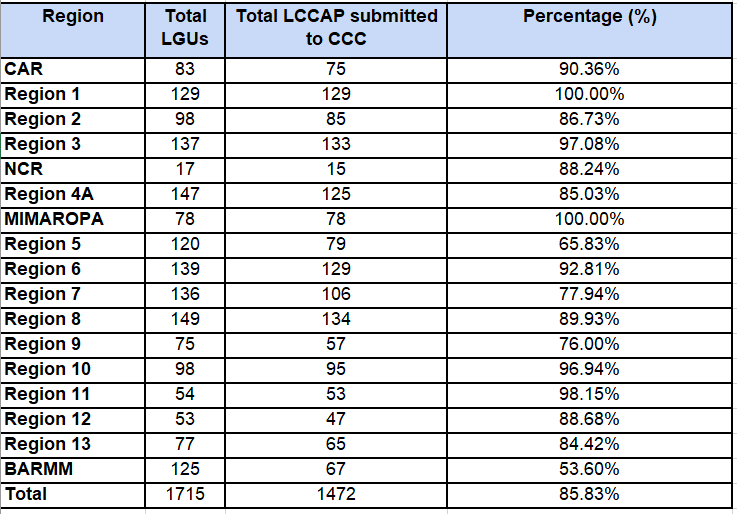-
RESOURCES
-
-
-
-
-
Local Climate Change Action Plan
Context
Pursuant to the Local Government Code of 1991, local governments are mandated to exercise their police powers and share with the national government the responsibility to manage and maintain ecological balance in their respective territorial jurisdiction (RA 1760, Section 2a, 15, 3i). As a corporate body, LGUs are mandated to promote the general welfare among inhabitants within its territorial jurisdiction (RA 1760, Section 2a, 16 & 17).
The Climate Change Act of 2009, as amended, and its Implementing Rules and Regulations recognizes the role of local governments as frontline agencies in the formulation, planning, and implementation of climate action plans in their respective areas, consistent with the provisions of the Local Government Code, the National Framework Strategy for Climate Change, and the National Climate Change Action Plan. Further, under the Section 14 of the same statute, LGs are mandated to furnish the Commission with copies of their action plans and all subsequent amendments, modifications, and revisions thereof, within one (1) month from their adoption.
Lastly, DILG Memorandum Circular 2014-135 provided that city and municipal local governments consider climate change adaptation as one of their regular functions, supported by provincial governments through technical assistance, enforcement, and information management.
The Local Climate Change Action Plan
A LCCAP is the action plan formulated by local governments to address climate change concerns. It focuses on both climate change adaptation and mitigation and describes how LGUs plan to respond to the impacts of climate change and mainstream them into local development plans (i.e. land use plan, sectoral development plan, investment program).
Mainstreaming Timeline
- 2014 – The Department of the Interior and Local Government-Local Government Academy published the Guidebook on the Formulation of LCCAP (Book 1 and 2). Subsequently, the DILG issued Memorandum Circular 2014-135 to guide LGs in formulating said plan;
- 2014 – The then Housing and Land Use Regulatory Board published the Supplemental Guidelines on Mainstreaming Climate Change and Disaster Risks in the Comprehensive Land Use Plan;
- 2015 – The Department of Budget and Management, CCC, and DILG issued JMC 2015-01 encouraging LGs to identify, prioritize, and tag climate change-related programs, activities, and projects in their Annual Investment Program;
- 2016 – The DILG published the Local Planning Illustrative Guide in Preparing and Updating the Comprehensive Development Plan to include climate change considerations in the process;
- 2017 – The DILG-LGA and CCC published the Enhanced LGU Guidebook on the Formulation of LCCAP (Book 3 and 4) to espouse the use of Climate and Disaster Risk Assessment and to encourage LGs to undertake low-emission development strategies taking off from the conduct of greenhouse gas inventory.
- 2020 and 2021 – The DBM in their issuance of the annual Local Budget Memorandum annexed the Visual Process Guide for CCET to demonstrate the sequencing of risk assessment, strategies identification, mainstreaming, and budget tagging.]
Compliance Monitoring
As of July 2023, there are already 1472 LCCAPs formulated by Local Government Units from 2005-2023. The table below shows the breakdown of the number of LCCAPs formulated in each region.
